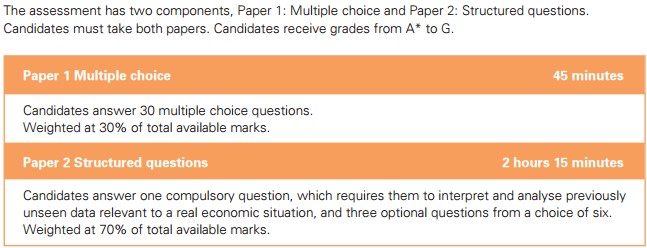พี่เชื่อว่าน้องๆที่กำลังเริ่มอ่านบทความการเรียนIGCSE Economicsนี้ สนใจในเนื้อหาการเรียนIGCSE Economics หรือการติวIGCSE Economics หรือการเตรียมตัวสอบIGCSE Economicsด้วยตัวเองก็ตาม ดีแล้วค่ะที่น้องๆมีการเตรียมตัว และทบทวนเนื้อหาทั้งหมดก่อนสอบ การที่น้องๆศึกษาเนื้อหาของการเรียนIGCSE Economics ทั้งหมดว่ามีอะไรบ้างก็ถือว่ามีชัยไปกว่าครึ่งแล้วค่ะ วันนี้พี่เลยนำเนื้อหาการเรียนIGCSE Economics แบบสรุปและอ่านง่ายมาฝากกัน เรามาดูกันเลยค่ะ หัวข้อหลักๆที่น้องๆจะต้องเรียนรู้และฝึกฝนให้แม่นยำก็มีอยู่8หัวข้อด้วยกัน ดังนี้
- Basic economic problem: choice and the allocation of resources
- economic problem
- factors of production
- opportunity cost
- resource allocation
- choice
- production possibility curves
- The allocation of resources: how the market works; market failure
- market and mixed economic systems
- demand and supply analysis
- price elasticity
- market failure
- social and private costs and benefits
- The individual as producer, consumer and borrower
- functions of money
- exchange
- central banks, stock exchanges and commercial banks
- labour market
- motives for spending, saving and borrowing.
- The private firm as producer and employer
- types and sizes of business organisation
- demand for factors of production
- costs and revenue
- profit maximisation and other business goals
- perfect competition
- monopoly
- advantages and disadvantages of increased scale.
- Role of government in an economy
- government as a producer and an employer
- aims of government economic policy
- fiscal, monetary and supply-side policies
- types of taxation
- possible policy conflicts
- government’s influence on private producers.
- Economic indicators
- price indices
- inflation and deflation
- employment and unemployment
- GDP, economic growth and recession
- GDP and other measures of living standards
- Developed and developing economies: trends in production, population and living standards
- developed and developing countries
- absolute and relative poverty
- alleviating poverty
- population growth
- differences in living standards.
- International aspects
- specialisation
- current account of the balance of payments
- current account deficits and surpluses
- exchange rate fluctuations
- protectionism and free trade.
เป็นอย่างไรกันบ้างคะ น้องๆมีหัวข้อไหนที่ตัวเองชอบในการเรียนIGCSE Economics หรือถนัดเป็นพิเศษหรือไม่คะ ถ้าใฝ่ฝันอยากได้เกรดดีๆในวิชานี้น้องๆต้องไม่เพียงแต่อ่านหนังสืออย่างเดียว น้องๆจะต้องฝึกทำข้อสอบเก่า (past paper) ให้ได้อย่างน้อย7-10ชุดนะคะ อย่างไรก็ตามก่อนที่เราจะฝึกทำ past paper นั้น เราควรจะรู้รายละเอียดการสอบ IGCSE Economics ซะก่อนว่าเราจะต้องไปเจอกับข้อสอบกี่ชุด แนวการสอบเป็นอย่างไร มีเวลาจำกัดเท่าไหร่ และแต่ละชุดนั้นให้คะแนนกันอย่างไร
ตาม IGCSE Economics Syllabus 2016 ที่ทาง CIE (Cambridge International Examinations) ได้กำหนดมา การสอบ IGCSE Economics ไม่มีการแบ่งระดับแบบ core หรือ extended นะคะ ดังนั้นผลคะแนนที่น้องจะได้รับคือ A* ถึง G ผู้สอบต้องสอบ paper 1 เป็นแบบปรนัย (multiple choice) ซึ่งเราจะได้คะแนนจากชุดนี้ 30% ของคะแนนทั้งหมด และ paper 2 เป็นแบบ structured question ชุดที่2นี้มีน้ำหนัก 70% ของคะแนนรวมทั้งซึ่งถือว่าเยอะกว่าชุดที่1
Photo Source: http://www.cie.org.uk/images/164334-2016-syllabus.pdf
วิชา IGCSE Economics ถือว่าสำคัญมากต่อผู้ที่จะศึกษาต่อทางด้าน Economics ไม่ว่าจะเป็นในประเทศไทย หรือต่างประเทศก็ตาม เพราะการเรียน IGCSE Economics นั้นเหมือนการปูพื้นฐานความรู้ทางด้านนี้เลยค่ะ พี่เขียนบทความนี้เพื่อแชร์ต่อให้น้องๆได้รู้ว่า การพิชิตเกรดที่ดีในการสอบ IGCSE Economics นั้นเป็นไปได้ไม่ยากหากเรารู้แนวการสอบและเตรียมตัวให้พร้อมก่อนไปสอบนะคะ พี่ๆยินดีให้คำปรึกษาน้องๆทุกคนที่อยากเจาะลึกการเรียน IGCSE Economics หรือ วิชาอื่นๆ ของการสอบ IGCSE ค่ะ
โทรสอบถามข้อมูลการเรียนที่ 022532533


